2007 CHEVROLET CORVETTE check engine light
[x] Cancel search: check engine lightPage 279 of 488
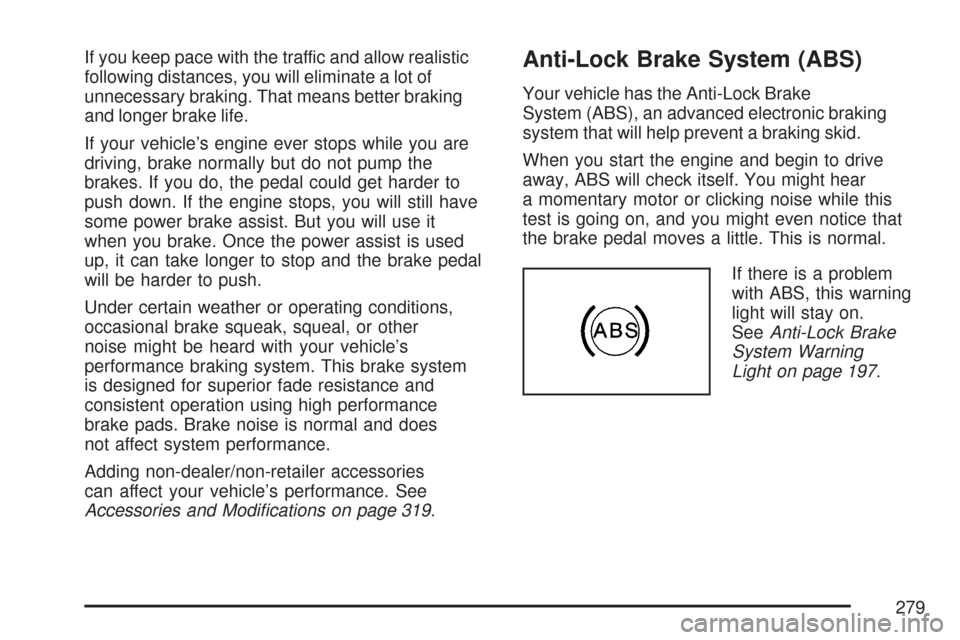
If you keep pace with the traffic and allow realistic
following distances, you will eliminate a lot of
unnecessary braking. That means better braking
and longer brake life.
If your vehicle’s engine ever stops while you are
driving, brake normally but do not pump the
brakes. If you do, the pedal could get harder to
push down. If the engine stops, you will still have
some power brake assist. But you will use it
when you brake. Once the power assist is used
up, it can take longer to stop and the brake pedal
will be harder to push.
Under certain weather or operating conditions,
occasional brake squeak, squeal, or other
noise might be heard with your vehicle’s
performance braking system. This brake system
is designed for superior fade resistance and
consistent operation using high performance
brake pads. Brake noise is normal and does
not affect system performance.
Adding non-dealer/non-retailer accessories
can affect your vehicle’s performance. See
Accessories and Modi�cations on page 319.Anti-Lock Brake System (ABS)
Your vehicle has the Anti-Lock Brake
System (ABS), an advanced electronic braking
system that will help prevent a braking skid.
When you start the engine and begin to drive
away, ABS will check itself. You might hear
a momentary motor or clicking noise while this
test is going on, and you might even notice that
the brake pedal moves a little. This is normal.
If there is a problem
with ABS, this warning
light will stay on.
SeeAnti-Lock Brake
System Warning
Light on page 197.
279
Page 307 of 488

You can run the engine to keep warm, but
be careful.
{CAUTION:
Snow can trap exhaust gases under
your vehicle. This can cause deadly
CO (carbon monoxide) gas to get inside.
CO could overcome you and kill you.
You cannot see it or smell it, so you
might not know it is in your vehicle.
Clear away snow from around the base
of your vehicle, especially any that is
blocking the exhaust pipe. And check
around again from time to time to be
sure snow does not collect there.
Open a window just a little on the side of
the vehicle that is away from the wind.
This will help keep CO out.
Run your engine only as long as you must.
This saves fuel. When you run the engine, make it
go a little faster than just idle. That is, push the
accelerator slightly. This uses less fuel for the heat
that you get and it keeps the battery charged.
307
Page 317 of 488

Service........................................................ 319
Accessories and Modi�cations................... 319
California Proposition 65 Warning.............. 320
Doing Your Own Service Work.................. 320
Adding Equipment to the Outside
of Your Vehicle...................................... 321
Fuel............................................................. 321
Gasoline Octane........................................ 321
Gasoline Speci�cations.............................. 322
California Fuel........................................... 322
Additives................................................... 323
Fuels in Foreign Countries........................ 324
Filling the Tank......................................... 324
Filling a Portable Fuel Container............... 327
Checking Things Under the Hood.............. 328
Hood Release........................................... 329
Engine Compartment Overview.................. 330
Engine Oil................................................. 333
Engine Oil Life System.............................. 340
Engine Air Cleaner/Filter............................ 342
Automatic Transmission Fluid.................... 345
Manual Transmission Fluid........................ 345
Hydraulic Clutch........................................ 346
Engine Coolant.......................................... 347
Coolant Surge Tank Pressure Cap............ 350Engine Overheating................................... 350
Overheated Engine Protection
Operating Mode..................................... 352
Cooling System......................................... 353
Power Steering Fluid................................. 358
Windshield Washer Fluid........................... 360
Brakes...................................................... 361
Battery...................................................... 364
Jump Starting............................................ 365
Rear Axle.................................................... 370
Bulb Replacement....................................... 371
High Intensity Discharge (HID) Lighting..... 371
Halogen Bulbs........................................... 372
Headlamps, Front Turn Signal, and
Parking Lamps....................................... 372
Taillamps, Turn Signal, and Stoplamps...... 374
Replacement Bulbs................................... 374
Windshield Replacement............................ 375
Windshield Wiper Blade Replacement....... 375
Tires............................................................ 378
Winter Tires.............................................. 379
Tire Sidewall Labeling............................... 380
Tire Terminology and De�nitions............... 382
Extended Mobility Tires............................. 384
In�ation - Tire Pressure............................. 386
Section 5 Service and Appearance Care
317
Page 321 of 488
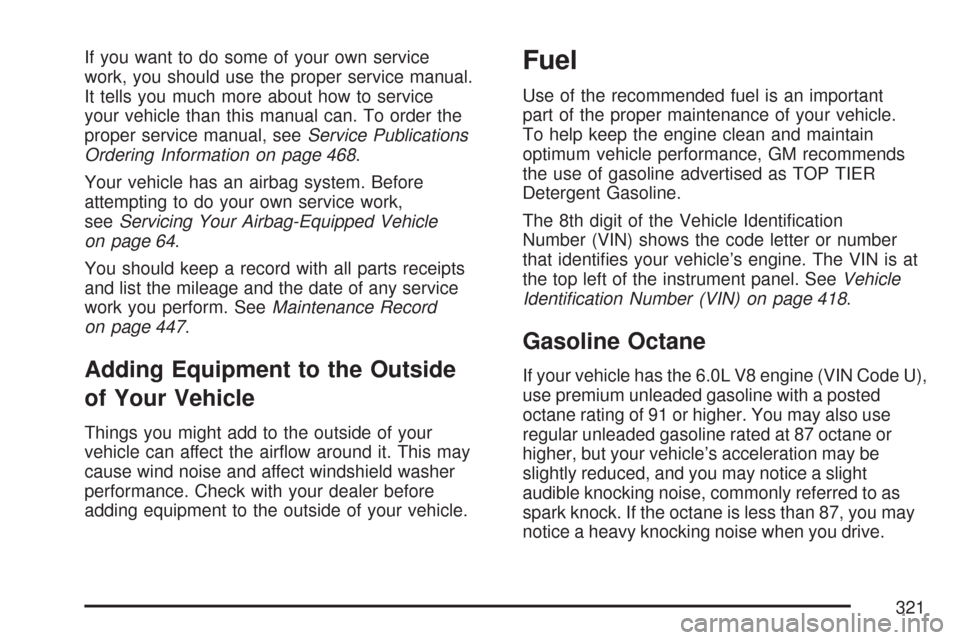
If you want to do some of your own service
work, you should use the proper service manual.
It tells you much more about how to service
your vehicle than this manual can. To order the
proper service manual, seeService Publications
Ordering Information on page 468.
Your vehicle has an airbag system. Before
attempting to do your own service work,
seeServicing Your Airbag-Equipped Vehicle
on page 64.
You should keep a record with all parts receipts
and list the mileage and the date of any service
work you perform. SeeMaintenance Record
on page 447.
Adding Equipment to the Outside
of Your Vehicle
Things you might add to the outside of your
vehicle can affect the air�ow around it. This may
cause wind noise and affect windshield washer
performance. Check with your dealer before
adding equipment to the outside of your vehicle.
Fuel
Use of the recommended fuel is an important
part of the proper maintenance of your vehicle.
To help keep the engine clean and maintain
optimum vehicle performance, GM recommends
the use of gasoline advertised as TOP TIER
Detergent Gasoline.
The 8th digit of the Vehicle Identi�cation
Number (VIN) shows the code letter or number
that identi�es your vehicle’s engine. The VIN is at
the top left of the instrument panel. SeeVehicle
Identi�cation Number (VIN) on page 418.
Gasoline Octane
If your vehicle has the 6.0L V8 engine (VIN Code U),
use premium unleaded gasoline with a posted
octane rating of 91 or higher. You may also use
regular unleaded gasoline rated at 87 octane or
higher, but your vehicle’s acceleration may be
slightly reduced, and you may notice a slight
audible knocking noise, commonly referred to as
spark knock. If the octane is less than 87, you may
notice a heavy knocking noise when you drive.
321
Page 352 of 488
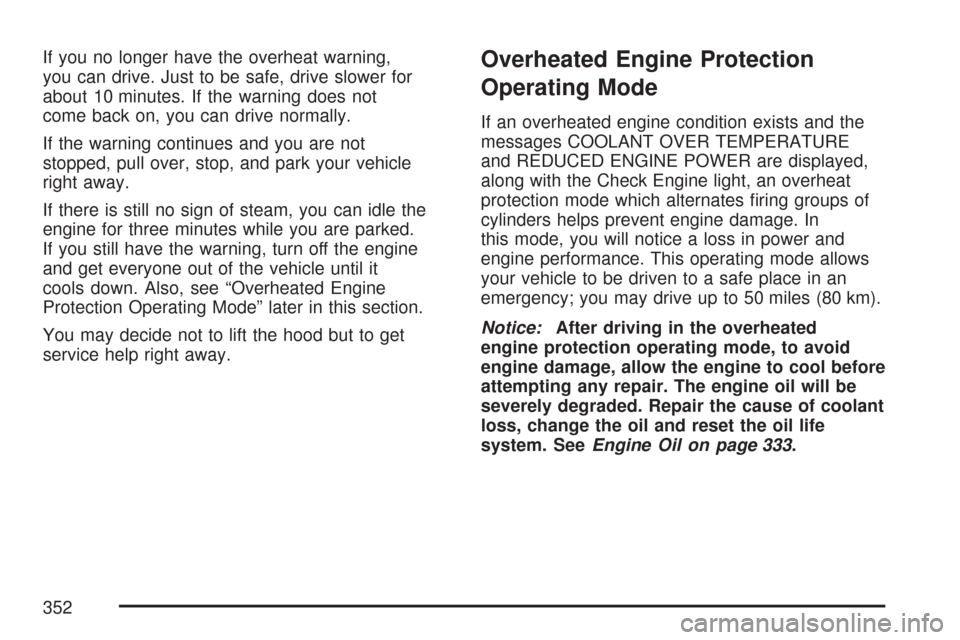
If you no longer have the overheat warning,
you can drive. Just to be safe, drive slower for
about 10 minutes. If the warning does not
come back on, you can drive normally.
If the warning continues and you are not
stopped, pull over, stop, and park your vehicle
right away.
If there is still no sign of steam, you can idle the
engine for three minutes while you are parked.
If you still have the warning, turn off the engine
and get everyone out of the vehicle until it
cools down. Also, see “Overheated Engine
Protection Operating Mode” later in this section.
You may decide not to lift the hood but to get
service help right away.Overheated Engine Protection
Operating Mode
If an overheated engine condition exists and the
messages COOLANT OVER TEMPERATURE
and REDUCED ENGINE POWER are displayed,
along with the Check Engine light, an overheat
protection mode which alternates �ring groups of
cylinders helps prevent engine damage. In
this mode, you will notice a loss in power and
engine performance. This operating mode allows
your vehicle to be driven to a safe place in an
emergency; you may drive up to 50 miles (80 km).
Notice:After driving in the overheated
engine protection operating mode, to avoid
engine damage, allow the engine to cool before
attempting any repair. The engine oil will be
severely degraded. Repair the cause of coolant
loss, change the oil and reset the oil life
system. SeeEngine Oil on page 333.
352
Page 475 of 488
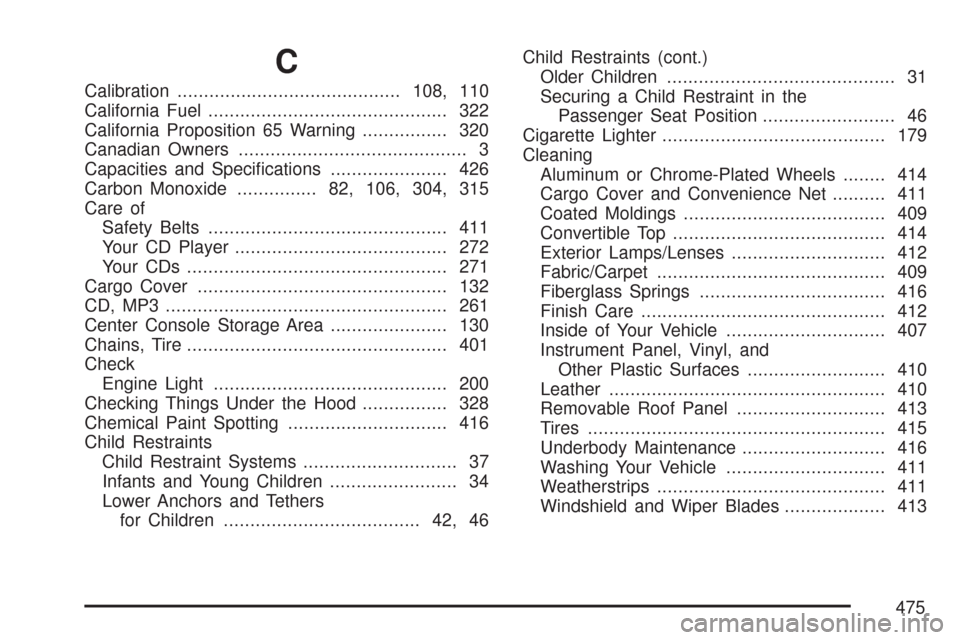
C
Calibration..........................................108, 110
California Fuel............................................. 322
California Proposition 65 Warning................ 320
Canadian Owners........................................... 3
Capacities and Speci�cations...................... 426
Carbon Monoxide............... 82,106, 304, 315
Care of
Safety Belts............................................. 411
Your CD Player........................................ 272
Your CDs ................................................. 271
Cargo Cover............................................... 132
CD, MP3 ..................................................... 261
Center Console Storage Area...................... 130
Chains, Tire................................................. 401
Check
Engine Light............................................ 200
Checking Things Under the Hood................ 328
Chemical Paint Spotting.............................. 416
Child Restraints
Child Restraint Systems............................. 37
Infants and Young Children........................ 34
Lower Anchors and Tethers
for Children..................................... 42, 46Child Restraints (cont.)
Older Children........................................... 31
Securing a Child Restraint in the
Passenger Seat Position......................... 46
Cigarette Lighter.......................................... 179
Cleaning
Aluminum or Chrome-Plated Wheels........ 414
Cargo Cover and Convenience Net.......... 411
Coated Moldings...................................... 409
Convertible Top........................................ 414
Exterior Lamps/Lenses............................. 412
Fabric/Carpet........................................... 409
Fiberglass Springs................................... 416
Finish Care.............................................. 412
Inside of Your Vehicle.............................. 407
Instrument Panel, Vinyl, and
Other Plastic Surfaces.......................... 410
Leather.................................................... 410
Removable Roof Panel............................ 413
Tires........................................................ 415
Underbody Maintenance........................... 416
Washing Your Vehicle.............................. 411
Weatherstrips........................................... 411
Windshield and Wiper Blades................... 413
475
Page 478 of 488
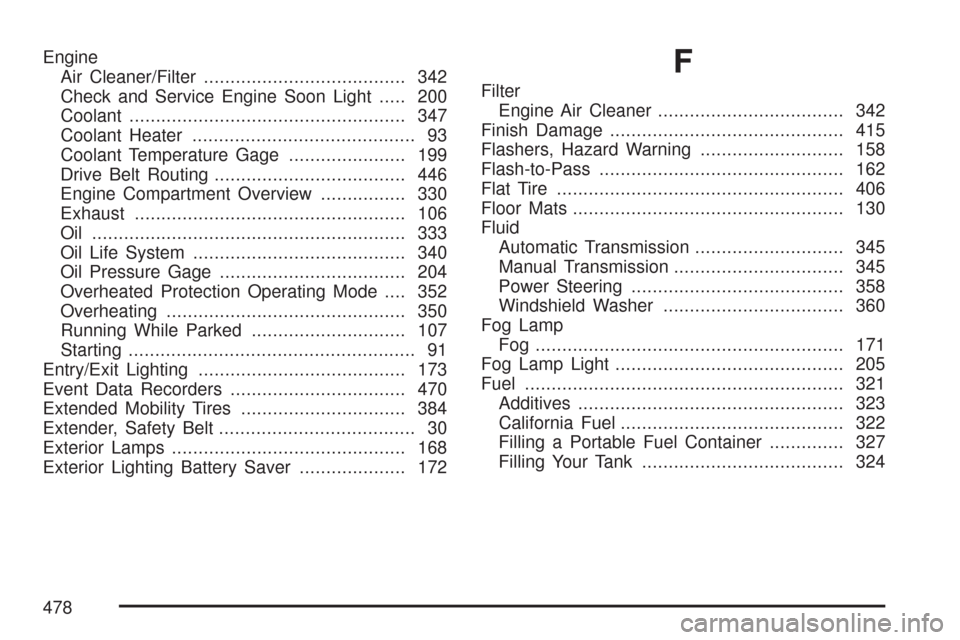
Engine
Air Cleaner/Filter...................................... 342
Check and Service Engine Soon Light..... 200
Coolant.................................................... 347
Coolant Heater.......................................... 93
Coolant Temperature Gage...................... 199
Drive Belt Routing.................................... 446
Engine Compartment Overview................ 330
Exhaust................................................... 106
Oil ........................................................... 333
Oil Life System........................................ 340
Oil Pressure Gage................................... 204
Overheated Protection Operating Mode.... 352
Overheating............................................. 350
Running While Parked............................. 107
Starting...................................................... 91
Entry/Exit Lighting....................................... 173
Event Data Recorders................................. 470
Extended Mobility Tires............................... 384
Extender, Safety Belt..................................... 30
Exterior Lamps............................................ 168
Exterior Lighting Battery Saver.................... 172F
Filter
Engine Air Cleaner................................... 342
Finish Damage............................................ 415
Flashers, Hazard Warning........................... 158
Flash-to-Pass.............................................. 162
Flat Tire...................................................... 406
Floor Mats................................................... 130
Fluid
Automatic Transmission............................ 345
Manual Transmission................................ 345
Power Steering........................................ 358
Windshield Washer.................................. 360
Fog Lamp
Fog .......................................................... 171
Fog Lamp Light........................................... 205
Fuel............................................................ 321
Additives.................................................. 323
California Fuel.......................................... 322
Filling a Portable Fuel Container.............. 327
Filling Your Tank...................................... 324
478
Page 479 of 488
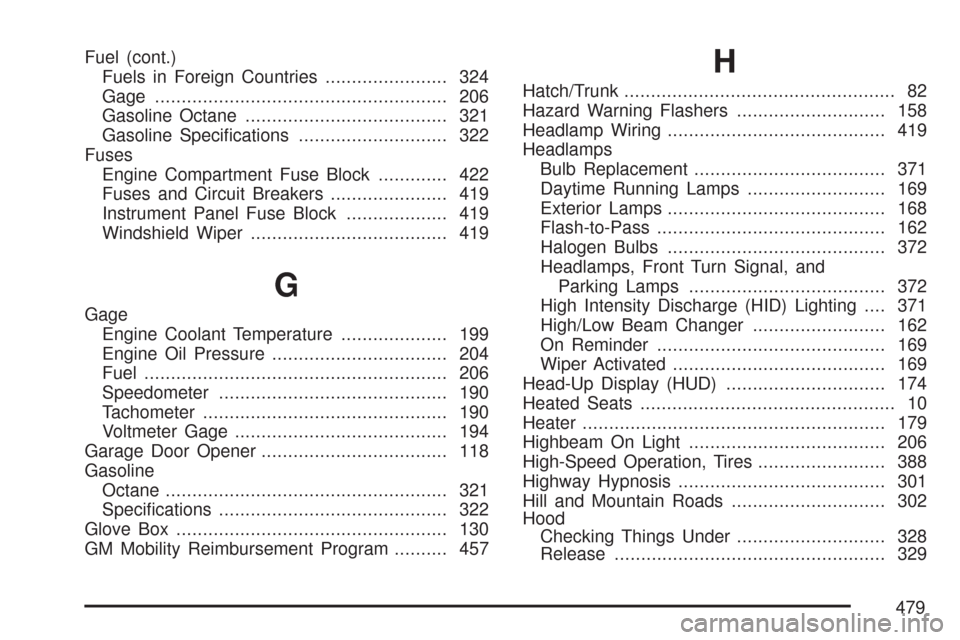
Fuel (cont.)
Fuels in Foreign Countries....................... 324
Gage....................................................... 206
Gasoline Octane...................................... 321
Gasoline Speci�cations............................ 322
Fuses
Engine Compartment Fuse Block............. 422
Fuses and Circuit Breakers...................... 419
Instrument Panel Fuse Block................... 419
Windshield Wiper..................................... 419
G
Gage
Engine Coolant Temperature.................... 199
Engine Oil Pressure................................. 204
Fuel......................................................... 206
Speedometer........................................... 190
Tachometer.............................................. 190
Voltmeter Gage........................................ 194
Garage Door Opener................................... 118
Gasoline
Octane..................................................... 321
Speci�cations........................................... 322
Glove Box................................................... 130
GM Mobility Reimbursement Program.......... 457
H
Hatch/Trunk................................................... 82
Hazard Warning Flashers............................ 158
Headlamp Wiring......................................... 419
Headlamps
Bulb Replacement.................................... 371
Daytime Running Lamps.......................... 169
Exterior Lamps......................................... 168
Flash-to-Pass........................................... 162
Halogen Bulbs......................................... 372
Headlamps, Front Turn Signal, and
Parking Lamps..................................... 372
High Intensity Discharge (HID) Lighting.... 371
High/Low Beam Changer......................... 162
On Reminder........................................... 169
Wiper Activated........................................ 169
Head-Up Display (HUD).............................. 174
Heated Seats................................................ 10
Heater......................................................... 179
Highbeam On Light..................................... 206
High-Speed Operation, Tires........................ 388
Highway Hypnosis....................................... 301
Hill and Mountain Roads............................. 302
Hood
Checking Things Under............................ 328
Release................................................... 329
479